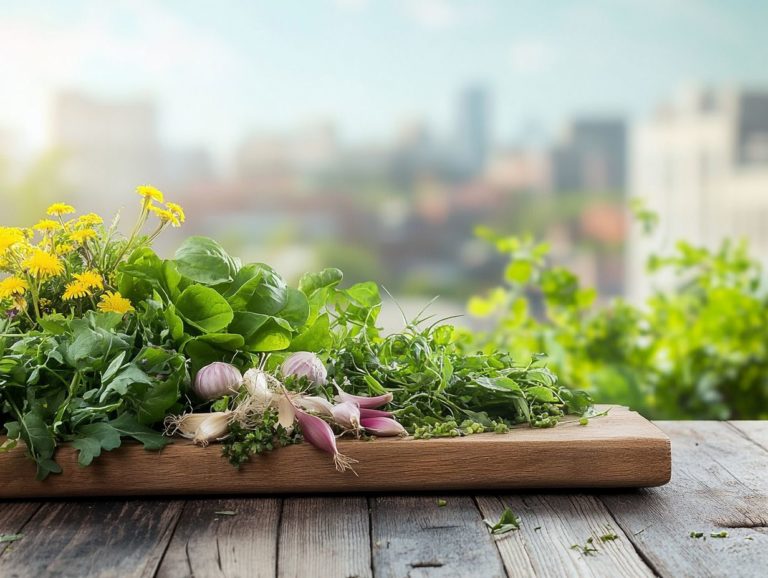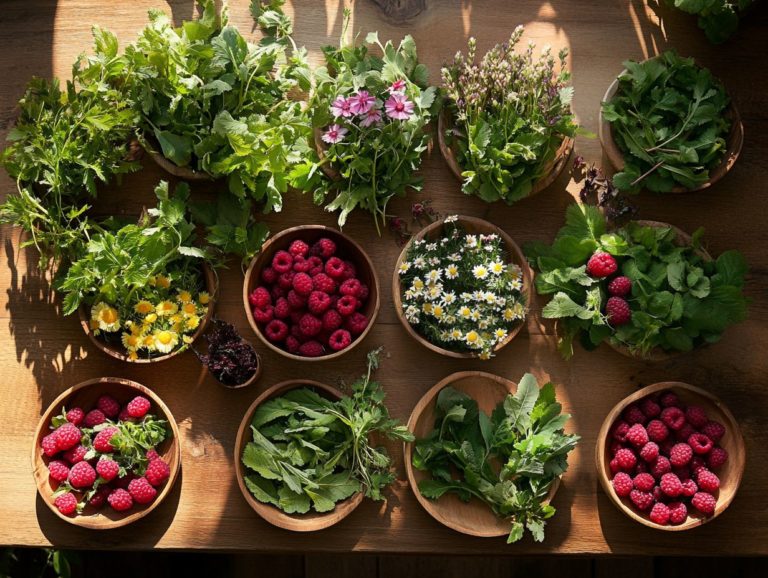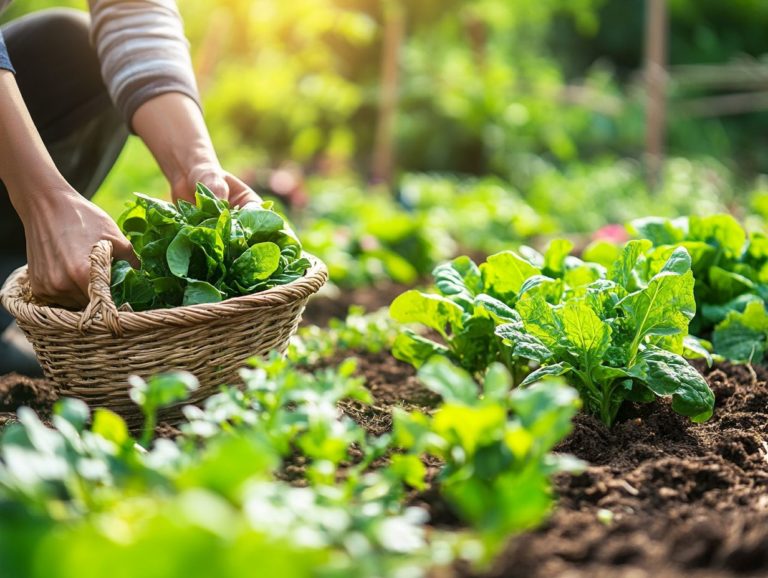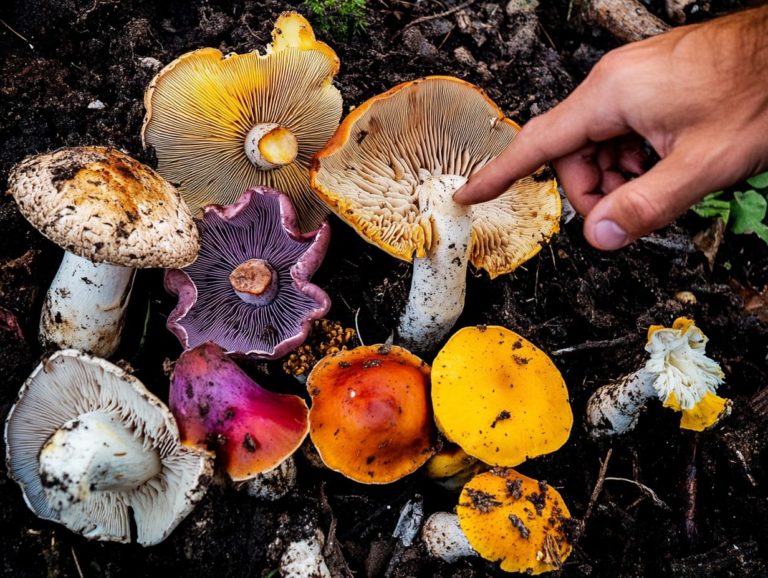5 Ways Edible Plants Support Biodiversity
Edible plants provide far more than mere sustenance; they are essential for the variety of life on our planet.
These remarkable plants enhance ecosystem health by encouraging pollination, offering habitats for wildlife, and maintaining the delicate balance in your gardens.
You’ll find practical tips for integrating edible plants into your space, from choosing native species to crafting diverse plantings.
Dive into the environmental, social, and economic advantages of cultivating these green treasures, all while nurturing a vibrant ecosystem.
Contents
- Key Takeaways:
- Edible Plants and Their Role in Supporting Biodiversity
- Ways to Incorporate Edible Plants into Your Garden
- Benefits of Growing Edible Plants for Biodiversity
- Frequently Asked Questions
- Curious about biodiversity? Here s what you need to know!
- How do edible plants contribute to biodiversity?
- What are some ways that edible plants support pollinator populations?
- How do edible plants help with soil health and nutrient movement in the soil?
- Can growing edible plants in your own garden help promote biodiversity?
- Wondering which edible plants boost biodiversity?
Key Takeaways:
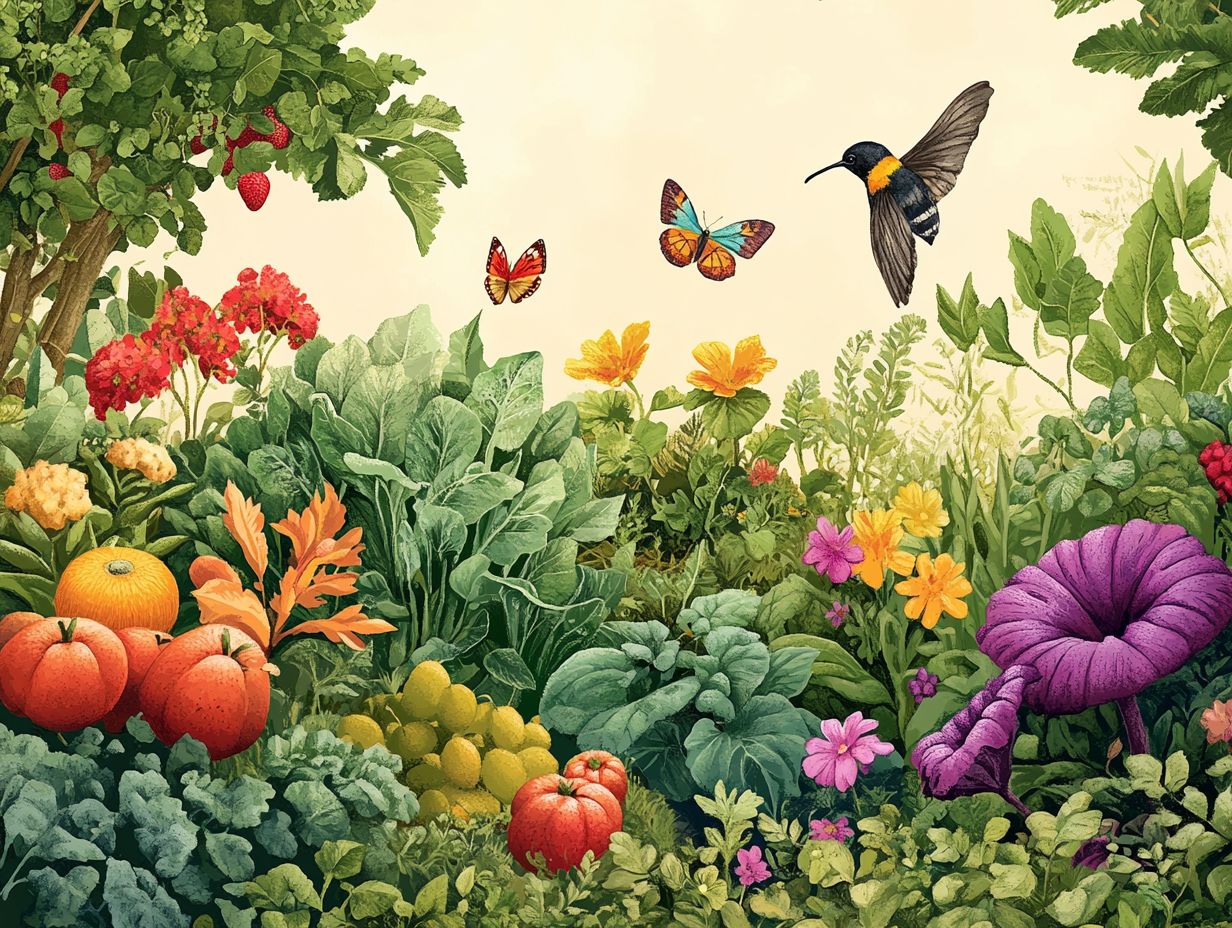
- Edible plants promote a vibrant variety of life by encouraging pollination and providing homes for wildlife.
- Using native edible plants leads to a healthier, more balanced garden ecosystem.
- Growing these plants benefits the planet and supports local communities economically.
Discover the Wonders of Edible Plants!
Edible plants are essential for your diet, enriching not only your meals but also local ecosystems. They thrive in various environments, especially in community gardens and local farms. By incorporating these plants into your meals, you enhance food security while supporting sustainable farming practices that honor local ecosystems.
When you integrate a colorful mix of fruits, vegetables, herbs, and grains into your everyday cooking, you re not just satisfying your taste buds; you re also celebrating the rich tapestry of flavors different cultures offer, which promotes culinary diversity. Nutritionally, many of these plants are low in calories yet packed with essential vitamins and minerals vital for your health.
Growing a colorful mix of edible plants boosts resilience in our ecosystems and adds beauty to your garden! This harmonious relationship between your dietary choices and environmental health encourages you to prioritize foods from nearby farms. In doing so, you not only strengthen local economies and communities but also embrace a sustainable diet that reflects a commitment to both human and ecological well-being.
Why is Variety of Life Important?
The variety of life is essential for the health of our planet, ensuring that ecosystems remain stable and can support life yours included. It provides vital services like pollination for crops, nutrient cycling, and resilience against environmental challenges. This rich tapestry of diverse species not only bolsters food security but also contributes to local economies.
The interconnectedness of various species strengthens ecosystem health, acting as a buffer against climate change and habitat loss. When local wildlife thrives, it plays a crucial role in maintaining the ecological balance that ensures clean air and water.
Conserving biodiversity is not merely a scientific endeavor; it’s a necessity for fostering healthy ecosystems capable of adapting to changing conditions. Protecting diverse species secures medicinal resources and promotes agricultural diversity, both of which are vital for resilient food systems.
Ultimately, preserving the variety of life is a cornerstone of sustainable development and a critical investment in your future.
Edible Plants and Their Role in Supporting Biodiversity
Edible plants are pivotal in nurturing biodiversity, enhancing local ecosystems, and bolstering sustainable farming practices. To better understand these plants, consider exploring 5 ways to remember edible plant characteristics. By integrating these plants into your farming approach, you can significantly promote local biodiversity while simultaneously supporting vibrant economies.
They provide an invaluable opportunity for organic farmers and community-supported agriculture initiatives to cultivate a rich variety of crops that honor local habitats and strengthen food security.
Join us in making your garden a haven for biodiversity!
Promoting Pollination and Ecosystem Health
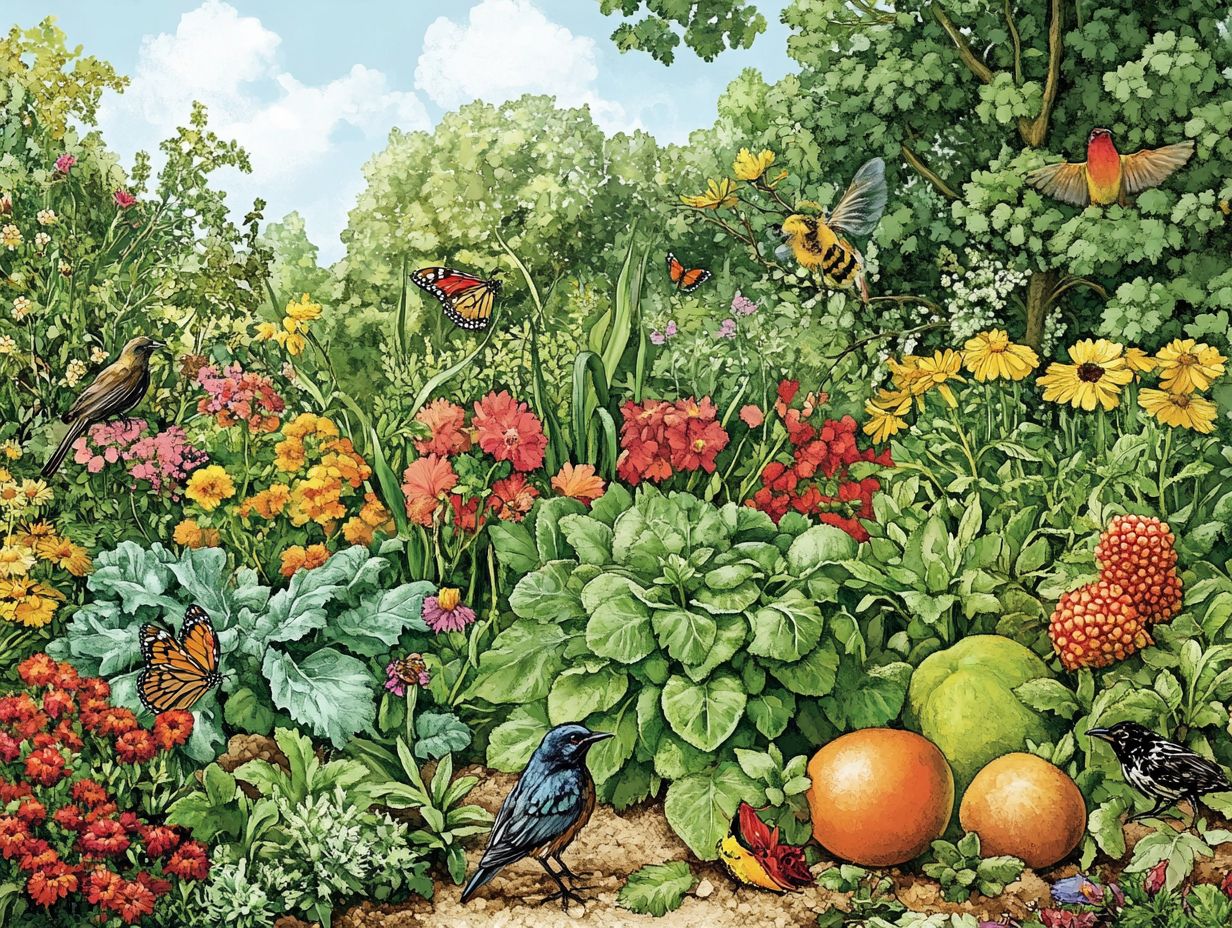
Promoting pollination is vital for healthy ecosystems. It directly influences the production of fruits and vegetables cornerstones of food security and biodiversity.
By focusing on edible plants, especially those that attract bees and other pollinators, you can significantly boost local wildlife. This contributes to effective biodiversity solutions within agricultural landscapes.
When you cultivate these plants, you beautify your space while creating habitats that encourage essential pollinators to thrive. This effort supports the intricate web of life in the ecosystem and enhances the survival of various species, including birds, butterflies, and insects. It also ensures the stability of local food systems.
Maintaining a diverse array of plant life promotes soil health and resilience against climate challenges. You contribute to creating sustainable environments that nurture wildlife and sustain human populations, emphasizing the profound connection between ecosystem health and biodiversity.
Providing Habitat for Wildlife
Providing habitat for local wildlife is an often-overlooked benefit of cultivating edible plants, especially native varieties. These support a diverse array of species and enhance urban biodiversity.
These plants serve as vital resources for pollinators and other wildlife. They help counteract environmental degradation while bolstering conservation efforts within local ecosystems.
By incorporating native edible plants into your gardens and landscapes, you elevate the aesthetic appeal of your surroundings. You also create essential ecosystems that nurture the health of local wildlife populations.
These native species provide shelter and food sources, attracting birds, beneficial insects, and small mammals that play crucial roles in maintaining ecological balance.
As the diversity of plant life increases, so does the resilience of the local habitat. This allows it to better withstand the challenges posed by climate change and human activity.
Prioritizing native edible plants in your conservation strategies is essential for fostering biodiversity while catering to human needs. Your actions can create a thriving environment for both people and nature!
Ways to Incorporate Edible Plants into Your Garden
Incorporating edible plants into your garden elevates culinary diversity while fostering local biodiversity and sustainable practices. By sourcing plants from local nurseries and engaging in community-supported agriculture, you enrich your diet and can learn about the role of edible plants in sustainable living, playing a vital role in nurturing the health of local ecosystems.
Choosing Native and Non-Invasive Species
Choosing native and non-invasive species is crucial for fostering biodiversity in your garden. These plants are perfectly adapted to local ecosystems. They support wildlife and enhance the overall health of your green space.
By prioritizing these species, you can create a sustainable environment that honors local habitats while effectively minimizing the risk of introducing harmful invasive plants.
To identify the best native flora for your area, research local plant guides or explore native plant society websites. Visiting nearby nurseries that focus on native species can also be incredibly beneficial; they often offer expert advice tailored specifically to your region.
Incorporating these plants attracts essential pollinators like bees and butterflies, and provides food and shelter for birds and beneficial insects.
Opting for varieties that require minimal maintenance allows you to cultivate a low-impact garden that thrives without relying on synthetic fertilizers or pesticides. This ensures a harmonious flourishing of both flora and fauna.
Creating a Balanced and Diverse Garden
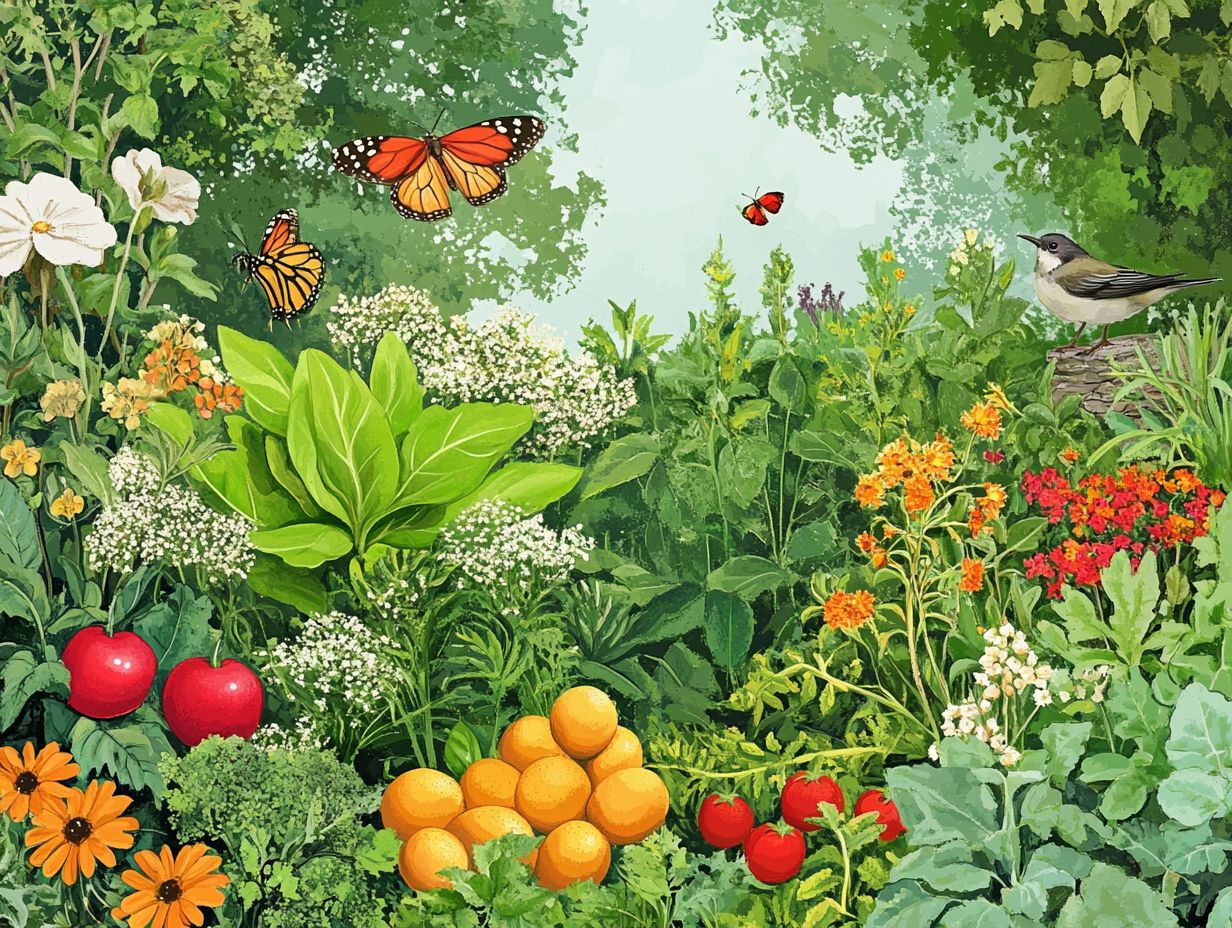
Creating a balanced and diverse garden is exciting! It helps enhance food biodiversity, supports local conservation efforts, and fosters sustainable diets. By incorporating a wide array of edible plants, you not only savor nutrient-rich produce but also play a significant role in bolstering the health of local farms and ecosystems.
Embracing the principles of plant diversity allows you to cultivate a more resilient garden. This attracts beneficial insects and pollinators that are vital for plant vitality. Practicing crop rotation ensures that your soil remains nutrient-rich, while minimizing pest and disease buildup, leading to healthier harvests.
When you grow various edible species fruits, vegetables, herbs, and legumes you create a dynamic ecosystem. This encourages natural pest control and enhances soil health. This harmonious environment boosts the yield of fresh produce and promotes a sustainable, environmentally friendly approach to gardening. Ultimately, it nurtures a thriving community dedicated to conservation and nutrition.
Benefits of Growing Edible Plants for Biodiversity
Cultivating edible plants offers a wealth of advantages for biodiversity. It enriches healthy ecosystems while bolstering conservation efforts. For those interested in foraging, learning about the top 10 edible plants to harvest sustainably is essential in combatting environmental degradation and nurturing community engagement in sustainable practices.
By embracing this endeavor, you contribute to a more vibrant and resilient natural world.
Environmental Benefits
The environmental benefits of growing edible plants are truly remarkable. You contribute to biodiversity conservation and the overall health of ecosystems while supporting local wildlife. These practices champion sustainable farming methods that can effectively reverse environmental degradation and enhance soil vitality.
When you cultivate a diverse range of edible plants, you re not just planting food; you re creating habitats that nurture a vibrant community of beneficial insects, pollinators, and birds. This diversity bolsters the resilience of ecosystems and aids in natural pest control, minimizing the reliance on chemical interventions.
Employing permaculture a sustainable gardening method that mimics natural ecosystems can significantly enhance water retention and reduce soil erosion. This makes your landscapes more sustainable in the face of climate change. Ultimately, growing edible plants is a practical and impactful step towards fostering resilient urban and rural environments, ensuring food security while maintaining ecological balance.
Social and Economic Benefits
The social and economic benefits of growing edible plants are truly remarkable, especially when you consider initiatives like community-supported agriculture. These programs not only bolster local economies but also celebrate culinary diversity. By engaging in these practices, you re enhancing food security by gaining access to nutritious options sourced right from your neighborhood.
As these initiatives flourish, they cultivate a network of individuals eager to share knowledge and resources. This leads to a community that is increasingly informed about nutrition and sustainable practices. Local farms reap significant economic rewards through direct sales to consumers, invigorating the local market while simultaneously cutting down on transportation costs and reducing carbon footprints.
As diverse edible plants gain popularity, they inspire both chefs and home cooks to explore new flavors and ingredients. This enriches the culinary landscape and draws in culinary tourism. The cumulative effect of these efforts fosters a vibrant local culture, uniting residents through shared meals and cherished experiences.
Frequently Asked Questions
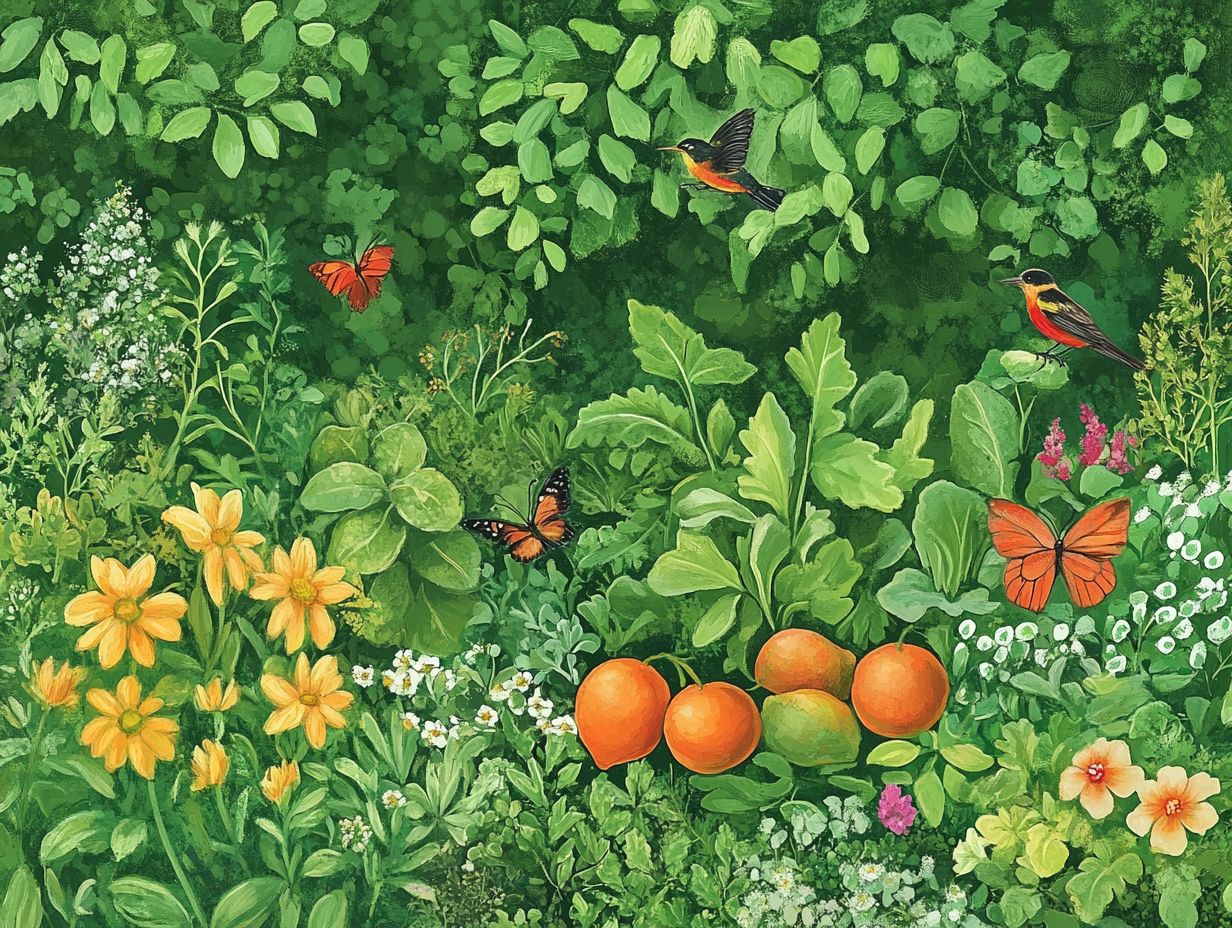
Curious about biodiversity? Here s what you need to know!
Biodiversity refers to the variety of life on Earth, including all plant and animal species and their genetic diversity. It is important because it helps maintain the balance of ecosystems and supports the sustainability of our planet.
How do edible plants contribute to biodiversity?
Edible plants are vital for biodiversity, providing habitat, food, and shelter for many animal species. Additionally, incorporating these plants into your meals can be fun; check out 5 ways to include wild edibles in your baking for some creative ideas.
These plants also maintain a healthy ecosystem by supporting pollinators and other beneficial insects.
What are some ways that edible plants support pollinator populations?
Edible plants like fruits and vegetables depend on pollinators for crop production. By providing a diverse range of plants, we can attract various pollinator species and help ensure their survival.
How do edible plants help with soil health and nutrient movement in the soil?
Edible plants, particularly those grown without synthetic fertilizers and pesticides, improve soil health. They promote the movement of nutrients essential for a vibrant ecosystem.
Can growing edible plants in your own garden help promote biodiversity?
Absolutely! Growing edible plants in your yard isn’t just fun; it’s a fantastic way to boost local biodiversity!
You can create a mini ecosystem that supports beneficial insects and other animals, contributing to overall biodiversity.
Wondering which edible plants boost biodiversity?
Consider native wildflowers, herbs, and fruit trees. These plants enrich your garden and support diverse wildlife.
By incorporating a variety of plants, you help sustain numerous animal species and enhance biodiversity.
Start your garden today and watch biodiversity thrive!

